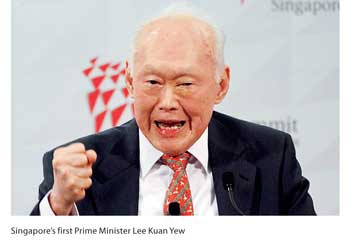31 Oct 2017 - {{hitsCtrl.values.hits}}
 BY Dinesh Weerakkody
BY Dinesh Weerakkody
Singapore has become a hotspot known for its efficient infrastructure. Often dubbed as the ‘Monaco of the East’, the red dot has beaten a path to steady economic progress and prosperity since the 1970s.
When President B.J. Habibie of Indonesia referred to Singapore as a “little red dot” in 1998, he meant it as a disparaging remark. Little would he have expected that Singapore would one day take it up as a badge of honour, a symbol of success, despite the odds.
President Habibie however sought later to make amends by saying he had not meant “little red dot” to be disparaging: he was speaking to a youth group and was challenging them to achieve progress and success of Indonesia by noting that Singapore, even though just a little red dot, had been able to make a success of itself.
What is the secret to Singapore’s success? Much of the city’s success can be attributed to the vision of one man – Lee Kuan Yew, Singapore’s first Prime Minister. He was in office from 1959 to 1990. The tenure made him the world’s longest-serving prime minister in history.
Lee-led Singapore in an era in which it rose ‘From Third World to First’, as he titled his 2000 book on the former British colony’s modern history. He realized very early that he can’t make a good omelette without breaking a few eggs.
Singapore broke away from neighbouring Malaysia and gained independence in 1965. About half a century ago, Singapore was an island without any natural resources to call its own.
Yew’s emphasis on growth, the thrust on making Singapore attractive as a destination for investment as well as the focus on drawing world-class manpower, building state-of-the-art infrastructure and excellent air and sea linkages, a low and transparent tax regime, clean and efficient bureaucracy, a strong regulatory and legal framework, a neutral diplomatic policy, which has ensured it is an ally of the West as well as China. Developing a clean and green city has ensured Singapore’s stupendous economic success. These factors have led to the emergence of Singapore as a powerful and wealthy financial centre.
His main contribution and the key to his success was that he understood that in order to put Singapore on a sustainable growth trajectory, one needs much more than sound economic policy.
In reality, any policy can be reversed, any incentives for growth can be dismantled, but when a country has an institutional set-up that is unparalleled. This includes the rule of law, efficient government structures, the continuous fight against corruption and overall stability. The country then can attract the best of the best.
Sri Lanka
In the early 60s, as Nepal’s only billionaire and CG Corp Global Chairman Binod Chaudhary said yesterday to a packed audience of accountants, “Many leaders looked to Ceylon as a model of Asian prosperity with little corruption and liberal politics.”
In the 60s gross domestic product of the country was much more than Singapore and South Korea. At that time many leaders in Ceylon had the determination in developing the country to a modern and dynamic city. Today most people in developing countries are ok for restricted freedom of expression, self-censorship and stunted multiparty democracy to overcome poverty.
As long as people are economically well off, with housing and food, if there is law and order, truth, honesty and economic progress, nobody cares much about politics or politicians. Many people would much rather live in a country like Singapore than a place where you have every freedom in the world but you are hungry and it is corrupt. Therefore, our priorities have to be right.
The explanation for success lies in an ability to trust a nation as a place where promises are kept, rule of law maintained, justice is assured and government policies are predictable.
Singapore offers reliability, integrity, quality, hard work and trustworthiness. These are what matters for long-term relationships and success.
In the final analysis, law and order, truth, honesty and economic progress — all of these require vision and all these boil down finally to sound leadership!
(Dinesh Weerakkody is a thought leader)
25 Nov 2024 57 minute ago
25 Nov 2024 1 hours ago
25 Nov 2024 2 hours ago
25 Nov 2024 4 hours ago
25 Nov 2024 4 hours ago